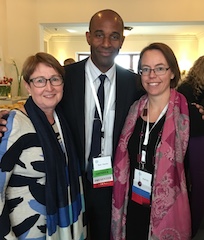Insiders and Outsiders – the pain and the gain
 Panelists Trisha Carter, Ryan Haynes, Marian van Bakel at #FIGT16NL
Panelists Trisha Carter, Ryan Haynes, Marian van Bakel at #FIGT16NL
In 2016, I led a panel at a Conference in Amsterdam. ‘Insiders and Outsiders –Is Belonging Overrated?’.
It was the conference of Families in Global Transition an organisation that speaks to the growth, success and well-being of people crossing cultures globally.
The people who were there were expats, migrants, global nomads. But most of them weren’t the employee who was moved.
They were the partners and the children of those who had been moved around the world by corporations, diplomatic corps, military, missionary, or NGOs. They were the people who fell in love and moved cultures to be with their partner, raising children who represent different cultures, speak multiple languages. They were the people who had returned ‘home’ to find they no longer felt ‘at home’. And they were the educators, the service providers, the researchers and the writers who tell the stories and support these groups on their journeys.
If anyone knew about being on the outside – these conference attendees did.
Our panel considered the feelings and behaviours of belonging and the feeling of being an insider. We reflected personally on what it is like to not belong – to sit on the outside - the discomfort that outsider experience brings.
Because it is uncomfortable being on the outside.
Being in a room where we are different in some way from the others around us. Where we don’t understand everything that is being said. Or possibly don’t understand anything! It’s uncomfortable when people respond to us in unexpected ways, or ask us to operate in ways that seem inappropriate or unwise according to our cultural ways.
Our brain’s most natural response to this sort of discomfort is flight or fight.
Our panel acknowledged the flight response – where the desire to belong and the difficulties of integrating can lead to fleeing to an ‘expat bubble’.
Dr Marian van Bakel Assistant Professor at the University of Southern Denmark, shared her research in The Netherlands and repeated in Denmark, how mentoring from local people assisted expats to avoid that bubble.
Ryan Haynes, a High School Counsellor, who has worked in the USA, Thailand, Taiwan and Oman, spoke about a successful buddy system his school in Bangkok had introduced to assist new students as they arrived.
Ryan tells his students “Don’t be afraid to get lost.”
Back then we began a conversation about how to sit comfortably in the discomfort of getting lost -of being an outsider.
It is uncomfortable getting lost, feeling like we don’t know how to navigate the territory in which we find ourselves, being on the outside. These things are wired into our brain’s automatic response system.
From the beginnings of time we have felt safest with those who were like us – our tribe - who would fight for us if we were threatened by outsiders. The automatic response part of our brain tells us not to trust the outsider and not to feel safe when we are on the outside.
And yet being on the outside and having an outsider join us can be positive –even when it doesn’t feel good.
Research by Katherine Philips and her team show that adding an outsider to a team leads to better problem solving.
We know this from a factual perspective - we know that diversity leads to better teams.
What we often don't talk about, is how that feels.
The more successful teams in Phillips’ research didn’t feel successful, didn’t feel comfortable, didn’t necessarily enjoy the experience. But they solved the problem significantly more often than those who were similar.
It’s not just that diversity brings increased perspectives, Phillips research shows that the discomfort itself causes us to perform better. “More conflict… leads to better outcomes.”
We need to learn to embrace the discomfort that diversity and outsiders bring.
We need to acknowledge that feeling, name it, and consciously will ourselves to continue in the situation.
Only in this way, will our pre-frontal cortex override our automatic neural programming to remind ourselves that being different, being on the outside or having outsiders join us in our group, is our best opportunity for success.
As Katherine Phillips says, “The pain is worth the gain.”
And this years FIGT Conference will be held in The Hague from 8th-10th March. Register now!
I will be writing more on this topic in the coming months as I can see it impacting on many aspects in our work and lives. If you want to explore further here are some other resources.
https://www.youtube.com/watch?v=lHStHPQUzkE
https://www.ted.com/talks/tim_harford_how_messy_problems_can_inspire_creativity
Brene Brown, Braving the Wilderness

 Build a Flourishing Life
Build a Flourishing Life
Reader Comments